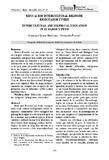| dc.rights.license | http://creativecommons.org/licenses/by-nc-sa/3.0/ve/ | |
| dc.contributor.author | Vanoni, Giuseppe | |
| dc.contributor.author | Franco, Bernarda | |
| dc.date.accessioned | 2016-06-28T17:06:22Z | |
| dc.date.available | 2016-06-28T17:06:22Z | |
| dc.date.issued | 2015-12 | |
| dc.identifier.issn | 1690-3544 | |
| dc.identifier.uri | http://www.saber.ula.ve/handle/123456789/42031 | |
| dc.description.abstract | Perú y Ecuador son dos países con un
rico bagaje cultural, en los cuales las comunidades
indígenas han tenido que luchar
para reclamar sus derechos y así participar
activamente en la vida económica y política
del país, pero sin perder su identidad, es
decir, sus lenguas, su cultura y sus tradiciones.
Para mantener su identidad, es necesario
recibir una educación justa, intercultural
y bilingüe; estos dos países ya poseen una
“Ley de Educación Intercultural Bilingüe”
pero esto significó años de negociaciones,
contando no siempre con el apoyo de sus
gobiernos sino de diferentes ONGs u otras
organizaciones. | es_VE |
| dc.language.iso | es | es_VE |
| dc.publisher | SABER-ULA | es_VE |
| dc.rights | info:eu-repo/semantics/openAccess | |
| dc.subject | Educación | es_VE |
| dc.subject | Comunidades indígenas | es_VE |
| dc.subject | Bilingüismo | es_VE |
| dc.subject | Diversidad | es_VE |
| dc.title | Educación intercultural bilingüe en Ecuador y Perú | es_VE |
| dc.title.alternative | Intercultural and bilingual education in Ecuador y Perú | es_VE |
| dc.type | info:eu-repo/semantics/article | |
| dc.description.abstract1 | Peru and Ecuador are both countries
with a rich cultural background, whose indigenous
communities have struggled for
gaining their rights to actively participate in
the economic and political aspects of their
countries, without losing their identities, in
other words, their language, culture and traditions.
In order to keep that identity, it is
essential to receive a fair, intercultural and
1 Profesor de la Universidad del Rosario de Colombia
en Bogotá.2 PhD. por la Universidad San Marcos de Lima,
Perú, catedrática de la Universidad Católica de
Guayaquil, Ecuador. bilingual education; these countries already
have an “Intercultural and Bilingual Law
of Education”, but this represented years
of negotiations, not always supported by
their governments but by different ONGs
or other organizations. | es_VE |
| dc.description.colacion | 148-159 | es_VE |
| dc.description.frecuencia | Anual | |
| dc.publisher.pais | Venezuela | es_VE |
| dc.subject.facultad | Núcleo Táchira (NUTULA) | es_VE |
| dc.subject.keywords | Education | es_VE |
| dc.subject.keywords | Indigenous communities | es_VE |
| dc.subject.keywords | Bilingualism | es_VE |
| dc.subject.keywords | Diversity | es_VE |
| dc.subject.seccion | Heurística: Artículos | es_VE |
| dc.subject.thematiccategory | Ciencias Económicas y Sociales | es_VE |
| dc.subject.tipo | Revistas | es_VE |
| dc.subject.unidadinv | Grupo de Investigación de Historia de la Educación y Representaciones (HEDURE) | es_VE |
| dc.type.media | Texto | es_VE |


